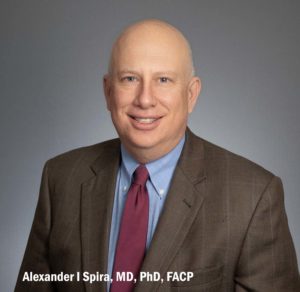Dr. Alexander I. Spira presented promising research findings at The American Society
of Clinical Oncology (ASCO) to help those with lung cancer.
(FAIRFAX, VIRGINIA) June 27, 2022 –– Chuck Tonkin, 82, has been battling cancer since 2018. Now with stage 4 lung cancer, with metastatic disease to his brain, has found a new drug, adagrasib, that is giving him his life back.
Dr. Alexander I. Spira, MD, PhD, FACP of Virginia Cancer Specialists (VCS) presented the latest clinical research findings on June 3 at the American Society of Clinical Oncology (ASCO) for abstract 9002 titled “KRYSTAL-1: Activity and safety of adagrasib (MRTX849) in patients with advanced/metastatic non–small cell lung cancer (NSCLC) harboring a KRASG12C mutation.” The study was published in the New England Journal of Medicine. Dr. Spira, who is the co-director of the VCS Research Institute, also serves as the clinical director and CEO of NEXT Virginia, which is a joint venture with VCS Research Institute designed to bring more of the latest in new agents and anticancer treatments to patients.
Along with Tonkin, who has been on this trial since June 2021, nearly 43% of patients enrolled in this early phase clinical trial with NSCLC that harbored the KRAS G12C mutation responded to the experimental drug adagrasib. The targeted agent also showed activity against lesions in the brain that metastasized from the lung tumors. Historically, lung cancer patients who are positive for KRAS mutation have a low response rate to other treatment options.
Adagrasib also demonstrated disease control rate of 80% among patients with previously treated KRAS G12C–mutated NSCLC.Mutations known as KRAS occur in about one in four patients with NSCLC, and approximately 13% of NSCLC patients’ tumors are driven by a specific KRAS mutation called G12C. KRAS lung cancers have been considered “untargetable” with targeted drugs after many years of research attempts. However, in 2021 a targeted drug, sotorasib, became the first drug approved by the Food and Drug Administration (FDA) for NSCLC patients whose tumors harbored the G12C mutation, based on a clinical trial showing a 36% response rate in those patients after having initially received treatment with chemotherapy and a PD-1 immune checkpoint inhibitor.
“This is exciting second-in-class data because we have seen this drug perform well against other solid tumors, and for those patients with NSCLC and test positive for the mutation, there is new hope with this therapy,” said Dr. Spira. “And in Mr. Tonkin’s case, this therapy is not only working against his lung cancer, but it has brain penetration, so it also is effective against metastatic disease. Based on this data, a new drug application for adagrasib has been accepted and is currently under review at the FDA.”
In Tonkin’s case, the cancer in his brain is no longer detectable, and the NSCLC is slowly decreasing. He and his wife, Marsha, credit Dr. Spira with finding this clinical trial that specifically targets his type of cancer. The Tonkins felt no apprehension about going on a clinical trial and saw it as an opportunity for hope after they received the news that the cancer was back and had metastasized to his brain in 2020.
“The first few months on the trial was a little rough because of my other health issues, but the minimal side effects are now nearly gone,” Chuck said. “I am certainly able to live with cancer and I am so glad to be back playing pickleball and my trombone again. I might just get back to the golf course and tennis court too.”
The Tonkins went into the clinical trial with “eyes wide open,” and said they have total confidence in Dr. Spira. According to Marsha, her husband has a good quality of life now because his physicians are helping him manage and prevent the spread of the disease.
“We are living with cancer because we accept it, and do what we have to do,” Marsha said. “Dr. Spira didn’t push the clinical trial but educated us and offered it to us. We will stay on it as long as we want and as long as it works.”
A Phase 3 trial evaluating adagrasib monotherapy versus docetaxel in previously treated patients with KRASG12C-mutant NSCLC is ongoing (NCT04685135).
###
About NEXT Oncology
NEXT Oncology is dedicated to the development of new anticancer agents for patients whose current cancer therapy is no longer working to benefit them and are looking for their next option. NEXT is partnered with
Texas Oncology, the largest private oncology practice in the United States with more than 400 referring oncologists and US Oncology, a network of independent, community-based oncologists in the U.S. This formidable size and reach provide NEXT unprecedented opportunities to transform what has come to be expected from clinical trials of new agents.
About Virginia Cancer Specialists
Virginia Cancer Specialists is the largest comprehensive private cancer practice in Northern Virginia. It features a world-class treatment team fighting cancer and diseases of the blood, offering access to the most current treatment protocols, clinical trials, and comprehensive care. Its fully staffed, comprehensive clinical research program also includes a dedicated research facility for Phase I clinical trials – the Virginia Cancer Specialists Research institute is largest of its kind in the Mid-Atlantic region. VCS offers medical oncology, radiation oncology, musculoskeletal tumor surgery, breast surgery, thoracic surgery, genetic counseling, palliative care, oncology nurse navigators, oncology infusion nurses, oncology pharmacists, social workers, dietitians, and laboratory technicians. Virginia Cancer Specialists is part of the US Oncology Network. This collaboration unites the practice with more than 1,400 independent physicians and research and data from thousands of cancer patients in clinical trials across the country. Virginia Cancer Specialists also participates in clinical trials through US Oncology Research, which has played a role in more than 100 FDA-approved cancer therapies. The network is supported by McKesson Corporation, a global leader in healthcare solutions.

